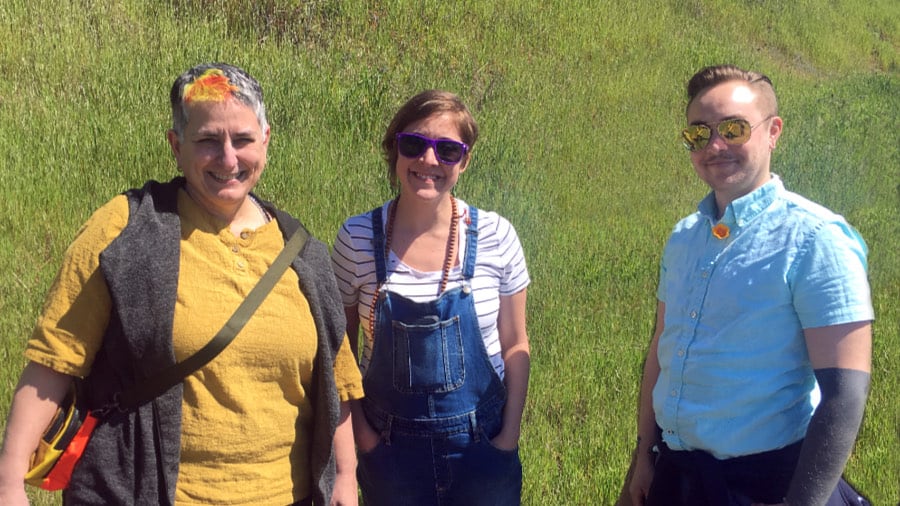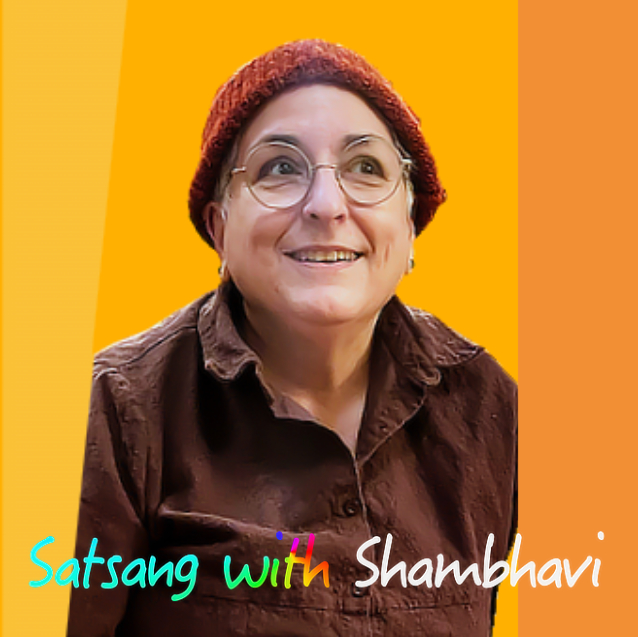Shambhavi talks about the role of beauty in sadhana, ducking other people’s karmas, and showing up as yourself in relationships. A podcast from Satsang with Shambhavi
STUDENT 1
Can you talk about beauty and the higher values of beauty but also, like, maybe the dark side of it too.
SHAMBHAVI
[laughs] The dark side of beauty. The traditions of direct realization use beauty to magnetize people to do sadhana. That's one aspect of beauty which you've heard me talk about before, which is that there's a lot of decoration and a lot of flowers and a lot of beautiful objects.
And these are used to magnetize us toward practice by feeding our senses and being a living symbol of the beauty of all of the creation.
In Buddhist terms—the way that we use beauty in the tradition, you know, beautiful altars, beautiful rooms, many, many, many colors and forms—this is not austere in terms of decorative aesthetics. In Buddhist terms, you could say this is related to sambhogakaya. So sambogakaya means the body of enjoyment.
And in the Buddhist traditions, they have a very useful way of talking about the different layers or levels of manifestation, which we would say a physical experience, an energetic experience, and a wisdom experience.
In the Buddhist tradition, they use this word, sambhogakaya to mean that middle level of energy and it means the manifestation that is subtle and luminous and has a lot of form and can change very quickly and be kind of kaleidoscopic in its manifestation.
So there are various deities that are called sambogakaya and these are all highly ornamented and are visualized in a lot of detail and a lot of color in a lot of form. But basically, sombogakaya means the body of enjoyment and it is the layer of reality which sparkles and shines and magnetizes us. So there are specific deities that have the job of magnetizing us to practice.
And as a matter of fact, in some of the scholarly literature on those deities who often have a bow and arrow and the arrows are decorated with flowers, this is also true in the Hindu tradition. They're very similar deities, that these were sort of precursors to the Greco-Roman Cupid, because you know, you shoot the arrow in the heart.
But in these traditions, the devotee falls in love with God, not with another human being. When people ask how to want to do practice more regularly, one of the ways is to make your practice space very, very beautiful.
And when you're doing that, this isn't some gross indulgence. You're making your practice space and making it aesthetically beautiful and colorful. You are making it more like the dazzling aspect of reality.
So that's one aspect of beauty. And then the other aspect is that when our inner eyes open and we see more into the nature of things, there is a dazzling quality.
There's a gemlike, color-filled, luminous, dazzling quality which eventually resolves to something that is more like how we might cognize with our senses. That the appearance of wisdom, which isn't quite so full of form and color, but still has a luminous quality.
So this sort of magicalness is really related to the beauty of everything. And it's something that we can perceive with our senses when they become more open through doing sadhana.
Some of you may have this experience already. For instance, if you look into a night sky or you look into a darkened room, you can see many little multicolored lights. If some aspect of your vision is more open, not everybody sees that. But this is an aspect of that.
I once talked to like some sort of eye doctor about these colors. They just, of course, said something very material, rational, science-y thing about retinas and nerves and things. But that's really not what it is.
Because these phenomenon are never just about color and form. They're never just about vision. They're imbued with livingness, they are imbued with intelligence. And that after a time that can also be perceived.
So in the beginning, when our channels are just opening, we perceive things more or less physically, even energetically. Even when we have an energetic experience or perception, we're still perceiving it rather physically. It doesn't really feel alive to us. It's more I felt like a rushing thing, or I felt this or that or the other thing. But it still remains very much on a physical level. And eventually, though, the Presence aspect of it starts to come through more profoundly until eventually you see that much more fully and experience that much more fully.
STUDENT 2
I was wondering how to like, how to be in relationship with other people where you can call to the surface like karmic scripts in order to break free from them, how to deflect participation in that.
SHAMBHAVI
How to deflect—it's another D word which someone wisely pointed out to me some years ago, which is duck. Our tendency is to want to explain everything or to get everybody on board with the new program of not being in scripts or something like that, or to try to get people to recognize what's happening.
And very often that's just not appropriate or it's just a waste of our energy, or it's not what the other person wants or what they're ready for. So we have to use a lot of sensitivity to feel into when circumstances might allow for some articulation of what's happening and when, more often, it doesn't.
And so there's a bunch of different ways to deflect or duck, one of which is to just make light of whatever's happening, to use humor or to sort of a humorously or lightly state your intention to not go there with the person, whatever it is, make a sort of loving joke about it.
Another thing is to listen for a little while and then just politely excuse yourself, literally leave the space or leave the conversation and to just do it in a way that, as they say in Al-Anon, detach with love.
So it's not like a declaration of your independence but it's, I hear what you're saying, I know this is happening for you. I need to go right now. I have some other thing to do. I'll catch you later, or something like that.
It can be more honest with the situation allows for it. You know, I'm really feeling exhausted right now. I need to cut this short, wish you all the best kind of thing.
And then with people that you're more intimate with in a real way because of course we're like intimate with our parents and our siblings and maybe with some other people, coworkers or something, but it's not the same kind of intimacy necessarily where we can air these things explicitly although we might be able to.
And again, it's just a matter of really feeling into a situation in the moment when it's happening. Is there an opening here or is there not? Is there a way that this would be useful and beneficial or is there not?
Sometimes what people do when they're trying to change the terms of a relationship with somebody else is they ponder it forever. They're not with the person and they're thinking about what they want that relationship to be like which it isn't what it's like, and they're thinking about it and they're talking about it with other people and they're discussing with their therapist.
Maybe with their spiritual teacher and they're planning out how they're going to handle particular moments with that person and to some extent that might be occasionally useful, but it's really much more useful to just be with the person and try to suss out using your intelligence and your senses what's appropriate in the moment and be more spontaneous.
So when we're dealing with intimate partners or very close friends and we want to keep those relationships even though we've been kind of roped into playing a role in whatever it is that is going on for them—and recognize that we're only roped in because we think we're getting something out of it.
If we weren't really getting anything out of it we wouldn't even stick around for being roped in, but it might be that the only thing we're getting is not having that person be disappointed with us or angry with us, or it might be that we're getting companionship even though it's very shallow because we can't really appear as ourselves in front of that person.
You really should think about what you're getting out of it and be clear about that first.
It's just not all about what the other person is doing or demanding of you, and some of those things that other people are demanding of us or, I would say most of them are larger social things—cultural things, gendered things that everyone in our position, whatever that is, is being asked to play a role in.
And there are certain expectations that are happening that when we begin to be a little bit more aware of, very uncomfortable. So again, you can bring those things up after kind of sussing out in the moment if it seems like it's of value.
But ultimately you might have to decide can this relationship really be intimate or can't it?
Or can it be only intimate to a degree, but I can't really fully be myself around this person because they just don't want me to be.
Basically, that's what that boils down to and I think for women in particular, it's more you can't fully show up. You might be able to partially show up. You can't really fully show up. You can't really shine in the way that you really are because there are all these other needs of other people and expectations that you feel you have to meet.
So this is a lot of conditioning that you're experiencing and as you're trying to work through that conditioning and relieve yourself from it, the terms of relationships are going to change. Some people are going to go with you on that journey and some people aren't.
And some people are going to go with you a little way and then there'll be a break, but then they'll come back. So in terms of these intimate relationships it's really up to you to decide what kind of risk you are willing to take to understand more where you are being held by your own karmas in that circumstance, and also to understand how willing are you to take the risk to show up more fully because that's a big question.
How willing are you to just let the cards fall where they may and show up as yourself?
This is a big journey, a really big journey. You can take it in very small steps. You don't have to do it all at once and in fact, no one really could do it all at once because we are bound by our own karmas and we can only release those things.
It's like untying one of those little knots that happens in your jewelry box when the thing with the chain gets all knotted up in itself.
You can't just go [gestures] you want to just pull it apart, but you actually have to go in there and look at it really closely and pull out little bits and maybe you have to get a little tool and nurse it out of it [laughs].
So it takes you time and work just for yourself, forget about anybody else, to tease out all those things and take little small risks along the way and relax in small ways.
But it really amounts to, in community with others, in relationship with others from your perspective, it amounts to opening up to this discernment in the moment rather than trying to plan everything out and then taking risks when it feels like there's a point to it, right?
So we don't want to just have this concept like I should take risks with everyone because everyone isn't playing with you that way.
So again, there's a lot of discernment that's required and when you decide that someone is receptive, or at least partially receptive, to changing the terms of a relationship because you're growing, you can start taking those risks, but understand that there's going to be rocky parts too, because you're basically changing a contract between you and somebody else as you're growing.
And that always entails some kind of rockiness, even if the person is very willing. That's really kind of a rule of thumb about life as a human being, that we have to disappoint people if we want to grow.
If we've been serving other people's needs in a certain way, and then we find that that way that we've been serving to be binding on ourselves and we want to stop doing that, it's just inevitable. We cannot grow without disappointing people.
But the people that are really game for this whole process are going to just temporarily be disappointed, and then they'll recover from that. That's my experience anyway.
So communities of spiritual practitioners, of course, are a little bit different because in general, there's an expectation that we would be able to be more explicit about what's happening between ourselves and other people in a spiritual community. That's not always true.
And I can just tell you from Jaya Kula, when people are growing and these things are happening, there is pushback and there are arguments that happen and hurt feelings that happen.
This is just a normal community of people.
But there's still some kind of underlying expectation that this is the work that we're doing, right? So there's nothing odd about pointing out how someone is behaving or bringing to someone how you want to change and how you like things to be different.
But there still has to be some kind of assessment in each individual situation about whether there's actually any game afoot here. Even within a spiritual community, there might be someone who just has a problem with somebody else and then just decides, well, there's no opening here, so I'll just work on it myself. Now, this is like, very complicated, but it is complicated. It takes a lifetime.
STUDENT 2
This specific thing that I'm coming up against and I'm seeing it kind of like line up in different aspects of my life is like the lock and key relationship between somebody who's angry and someone who always thinks they're doing something wrong.
But I also have this real internalized sense of like, well, I should reflect on did I do something wrong? Or could I have been better? It doesn't always feel as clean as deflecting somebody else.
SHAMBHAVI
Yeah, of course, so when you're asking yourself, is there any merit to this person's criticism of me or their observation, ask yourself that same question, could I have done anything better? Did I do anything that I regret? And if the answer is no, take your own answer for truth.
I think that would be a very good first step. Just stand in your own answer. And one thing I recognized when I was very young was, even if I'm wrong, this is how I feel about it. Even if I'm wrong and if ten years from now I think I was wrong right now, this is what I feel, this is my reality right now and I'm going to stand with myself.
It doesn't matter if ultimately I have some other take on it later on. All you've got is what you've got right now. So if you ask yourself this question and the answer is no, I did my best, or yeah, I made a little mistake, but it wasn't that big of a deal as this person is making out to be. Just let that be the truth for them. Let that be the reality.
Don't tax yourself with continually trying to placate.
You're basically trying to placate someone else by being the wrong party. And if you look deeper at that, what you really know is that people that do that, people that use undermining criticism and undermining anger to relate to other people, what you really know is that they feel very fragile even though they're taking up a position of seeming power and energy.
What you really know is that they're doing this. They're disparaging you and belittling you and criticizing you and trying to make you feel bad about yourself because that's how they feel about themselves.
And what you're really trying to deflect is the crisis of them experiencing their own fragility.
That is what is really unacceptable to both parties in that kind of lock and key situation. You're trying to help them maintain the fiction that they are not fragile and it almost seems unimaginable that you would let them feel their own fragility. And that's the thing you are not supposed to notice, right?
So you are actually—you have this wisdom, you have this insight about it. That's what's actually wrong, that's actually what's dangerous. That you actually see the reality of the situation. That's what would blow up the whole circumstance. And then being afraid of losing connection because you have wisdom and clarity about it.
Sign up to receive email updates
Enter your name and email address below and I'll send you periodic updates about the podcast.


